美国文学-超验主义
- 格式:ppt
- 大小:2.03 MB
- 文档页数:6
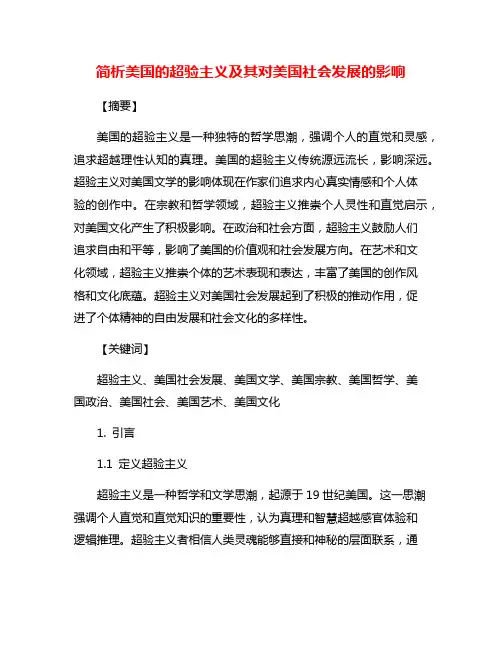
简析美国的超验主义及其对美国社会发展的影响【摘要】美国的超验主义是一种独特的哲学思潮,强调个人的直觉和灵感,追求超越理性认知的真理。
美国的超验主义传统源远流长,影响深远。
超验主义对美国文学的影响体现在作家们追求内心真实情感和个人体验的创作中。
在宗教和哲学领域,超验主义推崇个人灵性和直觉启示,对美国文化产生了积极影响。
在政治和社会方面,超验主义鼓励人们追求自由和平等,影响了美国的价值观和社会发展方向。
在艺术和文化领域,超验主义推崇个体的艺术表现和表达,丰富了美国的创作风格和文化底蕴。
超验主义对美国社会发展起到了积极的推动作用,促进了个体精神的自由发展和社会文化的多样性。
【关键词】超验主义、美国社会发展、美国文学、美国宗教、美国哲学、美国政治、美国社会、美国艺术、美国文化1. 引言1.1 定义超验主义超验主义是一种哲学和文学思潮,起源于19世纪美国。
这一思潮强调个人直觉和直觉知识的重要性,认为真理和智慧超越感官体验和逻辑推理。
超验主义者相信人类灵魂能够直接和神秘的层面联系,通过这种联系获取智慧和启示。
他们追求的是超越理性和经验的真实知识,通过直觉和感知来认识世界和自我。
在超验主义的世界观中,个人的内心和灵魂是最重要的,他们认为人类的灵魂具有无限的力量和智慧,可以直接与神秘的神性联系。
超验主义强调直觉和感知的重要性,认为通过深入的沉思和直觉体验,人类可以超越理性和经验的限制,接近真理和智慧的源泉。
超验主义是一种强调个人内在力量和直觉知识的哲学思潮,认为人类可以通过直觉和感知认识世界和自我,超越理性和经验的局限。
这种思想在19世纪美国的文学、宗教、哲学、政治、艺术和文化领域都有着深远的影响,对美国社会发展产生了重要的影响。
1.2 美国的超验主义传统美国的超验主义传统源自于19世纪初期的新英格兰地区,具有强烈的个人主义和反传统思想。
超验主义者强调个人直觉和经验,认为真理超越了理性和经验的限制。
他们主张通过直接体验自然和神秘领域来获取真知,反对社会规范和传统权威。

论惠特曼的超验主义思想惠特曼(Walt Whitman)被誉为美国诗人的先驱,其诗歌代表了19世纪超验主义运动的精神。
他以自由的形式和大胆的内容表达方式,唤起人们对自然、人类、宇宙以及个人内心的思考和关注。
本文将探讨惠特曼的超验主义思想,并分析其对现代文学和哲学的影响。
超验主义是一种哲学和文学运动,主张通过超越传统的知识和经验,追求超凡脱俗的真理和精神体验。
惠特曼在他的诗作《草叶集》中深刻地表达了他的超验主义思想。
他采用了独特的自由诗体,摒弃了传统的韵律和格律,取而代之的是长句、自由的排列和直接而强烈的表达方式。
在惠特曼的诗歌中,他强调了与自然的紧密联系。
他对大自然的热爱和倾慕贯穿于他的作品中。
他赞美了大地、花草和星星,将它们与人类的精神联系在一起。
他认为人们应该与自然和谐相处,感受大自然中蕴含的神性。
惠特曼的超验主义思想还体现在他对人类的关注和关爱上。
他关注普通人的生活,将他们视为生活的主角和英雄。
在他的诗作中,他赞美了平凡的工人、农民、水手,认为他们每个人都有独特的价值和美丽。
他鼓励人们摆脱社会束缚,追求自由和真正的个性。
此外,惠特曼的超验主义思想还突出了个体的力量和自由意志。
他认为每个人都可以通过内省和个人体验来触及超验的真理。
他主张摒弃传统的道德规范和宗教教条,追寻内在的道德和价值观。
惠特曼对超验主义的贡献不仅限于文学领域,在哲学和社会领域也产生了深远的影响。
他的诗歌鼓励人们思考宇宙、人类的存在和自身的内心世界,挑战了传统的观念和价值体系。
他的思想对后来的现代主义和现代文化运动起到了重要的推动作用。
总之,惠特曼的超验主义思想以其独特的诗歌形式和内容表达方式,将读者引入到一个超越日常经验的心灵之旅。
他对自然、人类和个人的关注以及对自由意志和内心体验的追求,呼应了超验主义运动的核心理念。
他的作品对于现代文学和哲学的发展产生了深远的影响,激发了人们对于生命和宇宙的思考和探索。

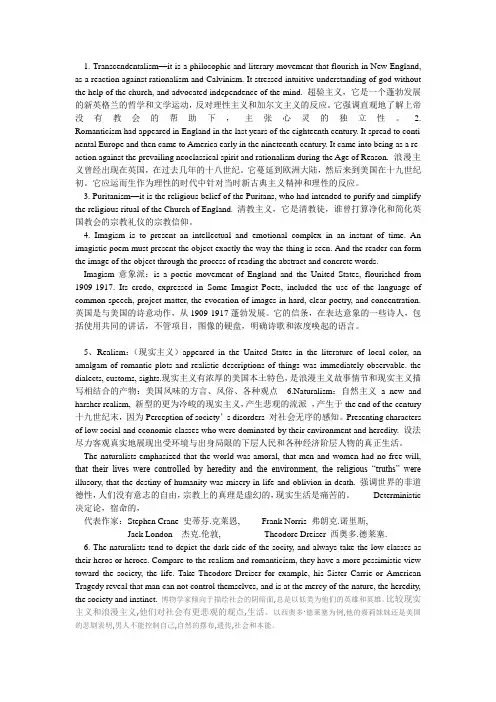
1. Transcendentalism—it is a philosophic and literary movement that flourish in New England, as a reaction against rationalism and Calvinism. It stressed intuitive understanding of god without the help of the church, and advocated independence of the mind. 超验主义,它是一个蓬勃发展的新英格兰的哲学和文学运动,反对理性主义和加尔文主义的反应。
它强调直观地了解上帝没有教会的帮助下,主张心灵的独立性。
2. Romanticism had appeared in England in the last years of the eighteenth century. It spread to conti nental Europe and then came to America early in the nineteenth century. It came into being as a re action against the prevailing neoclassical spirit and rationalism during the Age of Reason. 浪漫主义曾经出现在英国,在过去几年的十八世纪。
它蔓延到欧洲大陆,然后来到美国在十九世纪初。
它应运而生作为理性的时代中针对当时新古典主义精神和理性的反应。
3. Puritanism—it is the religious belief of the Puritans, who had intended to purify and simplify the religious ritual of the Church of England. 清教主义,它是清教徒,谁曾打算净化和简化英国教会的宗教礼仪的宗教信仰。
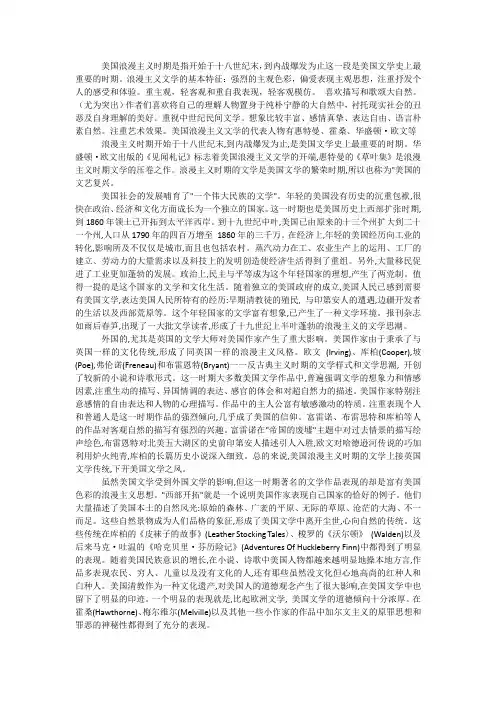
美国浪漫主义时期是指开始于十八世纪末,到内战爆发为止这一段是美国文学史上最重要的时期。
浪漫主义文学的基本特征:强烈的主观色彩,偏爱表现主观思想,注重抒发个人的感受和体验。
重主观,轻客观和重自我表现,轻客观模仿。
喜欢描写和歌颂大自然。
(尤为突出)作者们喜欢将自己的理解人物置身于纯朴宁静的大自然中,衬托现实社会的丑恶及自身理解的美好。
重视中世纪民间文学。
想象比较丰富、感情真挚、表达自由、语言朴素自然。
注重艺术效果。
美国浪漫主义文学的代表人物有惠特曼、霍桑、华盛顿·欧文等浪漫主义时期开始于十八世纪末,到内战爆发为止,是美国文学史上最重要的时期。
华盛顿·欧文出版的《见闻札记》标志着美国浪漫主义文学的开端,惠特曼的《草叶集》是浪漫主义时期文学的压卷之作。
浪漫主义时期的文学是美国文学的繁荣时期,所以也称为"美国的文艺复兴。
美国社会的发展哺育了"一个伟大民族的文学"。
年轻的美国没有历史的沉重包袱,很快在政治、经济和文化方面成长为一个独立的国家。
这一时期也是美国历史上西部扩张时期,到1860年领土已开拓到太平洋西岸。
到十九世纪中叶,美国已由原来的十三个州扩大到二十一个州,人口从1790年的四百万增至1860年的三千万。
在经济上,年轻的美国经历向工业的转化,影响所及不仅仅是城市,而且也包括农村。
蒸汽动力在工、农业生产上的运用、工厂的建立、劳动力的大量需求以及科技上的发明创造使经济生活得到了重组。
另外,大量移民促进了工业更加蓬勃的发展。
政治上,民主与平等成为这个年轻国家的理想,产生了两党制。
值得一提的是这个国家的文学和文化生活。
随着独立的美国政府的成立,美国人民已感到需要有美国文学,表达美国人民所特有的经历:早期清教徒的殖民, 与印第安人的遭遇,边疆开发者的生活以及西部荒原等。
这个年轻国家的文学富有想象,已产生了一种文学环境。
报刊杂志如雨后春笋,出现了一大批文学读者,形成了十九世纪上半叶蓬勃的浪漫主义的文学思潮。
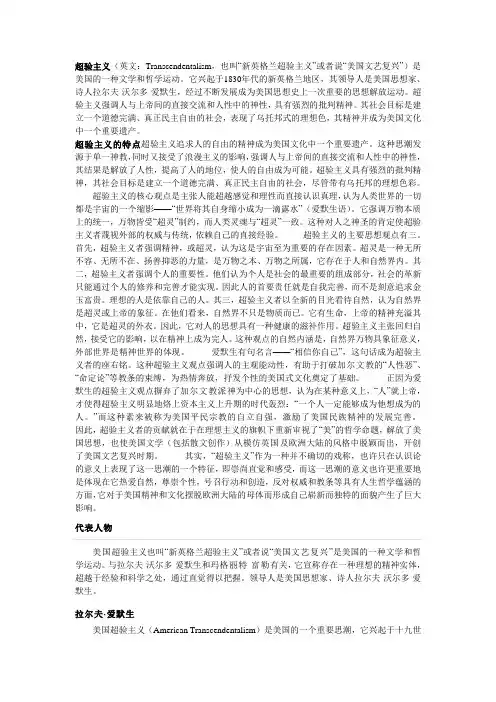
超验主义(英文:Transcendentalism,也叫“新英格兰超验主义”或者说“美国文艺复兴”)是美国的一种文学和哲学运动。
它兴起于1830年代的新英格兰地区,其领导人是美国思想家、诗人拉尔夫·沃尔多·爱默生,经过不断发展成为美国思想史上一次重要的思想解放运动。
超验主义强调人与上帝间的直接交流和人性中的神性,具有强烈的批判精神。
其社会目标是建立一个道德完满、真正民主自由的社会,表现了乌托邦式的理想色,其精神并成为美国文化中一个重要遗产。
超验主义的特点超验主义追求人的自由的精神成为美国文化中一个重要遗产。
这种思潮发源于单一神教,同时又接受了浪漫主义的影响,强调人与上帝间的直接交流和人性中的神性,其结果是解放了人性,提高了人的地位,使人的自由成为可能。
超验主义具有强烈的批判精神,其社会目标是建立一个道德完满、真正民主自由的社会,尽管带有乌托邦的理想色彩。
超验主义的核心观点是主张人能超越感觉和理性而直接认识真理,认为人类世界的一切都是宇宙的一个缩影——“世界将其自身缩小成为一滴露水”(爱默生语)。
它强调万物本质上的统一,万物皆受“超灵”制约,而人类灵魂与“超灵”一致。
这种对人之神圣的肯定使超验主义者蔑视外部的权威与传统,依赖自己的直接经验。
超验主义的主要思想观点有三。
首先,超验主义者强调精神,或超灵,认为这是宇宙至为重要的存在因素。
超灵是一种无所不容、无所不在、扬善抑恶的力量,是万物之本、万物之所属,它存在于人和自然界内。
其二,超验主义者强调个人的重要性。
他们认为个人是社会的最重要的组成部分,社会的革新只能通过个人的修养和完善才能实现。
因此人的首要责任就是自我完善,而不是刻意追求金玉富贵。
理想的人是依靠自己的人。
其三,超验主义者以全新的目光看待自然,认为自然界是超灵或上帝的象征。
在他们看来,自然界不只是物质而已。
它有生命,上帝的精神充溢其中,它是超灵的外衣。
因此,它对人的思想具有一种健康的滋补作用。
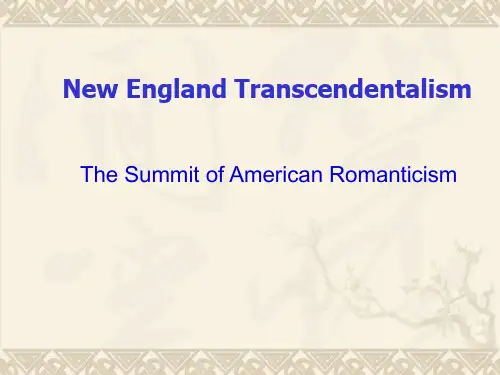

•什么是超验主义•超验主义对美国文学的影响•超验主义对美国性格的影响•赏析爱默生的名言爱默生在他的《超验主义者》一文中说“我们常说的超验主义就是理想主义。
”新英格兰的超验主义思想可以概括为以下几点:(一)强调精神,反对趋物主义超验主义者们强调精神,或者说是“超神”(Oversoul),为宇宙中最重要的物质。
“超神”是一种善的力量,它无所不在,无所不能,万物皆由其生,并成为其一部分。
它既存在于自然界中,也存在于人身上,是构成宇宙的几本成分。
•We learn that the highest is present to tht soul if man; that the dread universal essence,which is not wisdom, or love,or beauty,or power,but all in one,and each entirely,is that for which all things exist,and that by which they are;that spirit creates;that behind nature, throughout nature,spirit is present;one and not compound;it does not act upon us from without,that is, in space and time,but spiritually,or through ourselves.我们理解到,人的灵魂中存在着最崇高的东西;那令人敬畏的宇宙的本质不是智慧、爱情、美或权力,而是这一切独立体的总和,万物为它而存在,万物由它决定其存在;精神可以造物;在自然界的后面,浸透着自然界的是精神;它做为整体而不是混合体,不是从外面,即经过空间和时间,而是通过思想,或通过我们自身,对我们发生作用。
(二)重视个体•超验主义者重视个体的重要性。

美国超验主义的定义导言美国超验主义是一种独特的哲学和文化运动,起源于17世纪的美国殖民地时期。
它是一种融合了欧洲启蒙思想和美洲原住民智慧的哲学观念,强调个人的体验和直觉,以及对自然界与宇宙的深刻认知。
本文将深入探讨美国超验主义的定义及其在美国历史中的重要性。
一、美国超验主义起源美国超验主义起源于17世纪的新英格兰地区,它是由一群受基督教思想启发的英国清教徒所发展起来的。
这些清教徒在逃离英国王室的迫害后,希望在新大陆上寻求宗教和政治自由。
美国超验主义者受到新教改革启蒙思想以及欧洲启蒙运动的影响。
他们强调个体的直觉和个人灵魂的重要性,与当时的欧洲观念相对立。
而在相同的时期,美洲原住民的智慧和对自然的崇敬也对美国超验主义者产生了深远的影响。
二、美国超验主义的基本原则1. 直觉主义:美国超验主义者相信个体的直觉是获得真理的最重要方法。
他们认为人类可以通过直觉和体验来获得知识,而不仅仅依赖于传统的权威或逻辑推理。
2. 宇宙的普遍性:美国超验主义者相信宇宙中的一切都是相互联系的,并且人类的灵魂与宇宙紧密相连。
他们认为个体的存在是宇宙的一部分,人们可以通过与宇宙的联系来获得智慧和和谐。
3. 自然界的尊重:美国超验主义者崇尚自然界的美与力量,并对自然界保持敬畏之心。
他们认为与自然界和谐相处可以带来心灵的平静与幸福。
三、美国超验主义的学派和代表人物美国超验主义发展出了几个不同的学派,每个学派都有其独特的哲学观点和代表人物。
1. 第一代超验主义者:代表人物包括拉尔夫·沃尔多·爱默生、亨利·大卫·梭罗和玛格丽特·富勒等。
他们强调个体的直觉和内在精神,主张独立思考和自由的生活方式。
2. 第二代超验主义者:代表人物包括乔治·赫伯特·梅、詹姆斯·拉塞尔·洛厄尔和兰斯洛特·普康特等。
他们继承了第一代超验主义者的思想,但更加注重社会改革和人类进步。
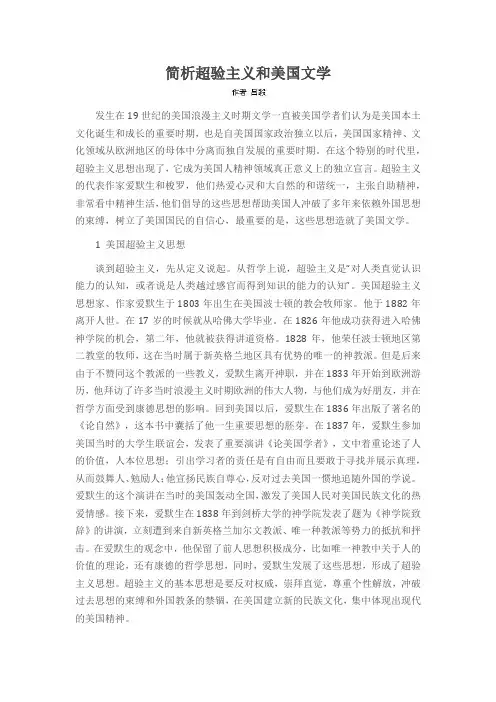
简析超验主义和美国文学发生在19世纪的美国浪漫主义时期文学一直被美国学者们认为是美国本土文化诞生和成长的重要时期,也是自美国国家政治独立以后,美国国家精神、文化领域从欧洲地区的母体中分离而独自发展的重要时期。
在这个特别的时代里,超验主义思想出现了,它成为美国人精神领域真正意义上的独立宣言。
超验主义的代表作家爱默生和梭罗,他们热爱心灵和大自然的和谐统一,主张自助精神,非常看中精神生活,他们倡导的这些思想帮助美国人冲破了多年来依赖外国思想的束缚,树立了美国国民的自信心,最重要的是,这些思想造就了美国文学。
1 美国超验主义思想谈到超验主义,先从定义说起。
从哲学上说,超验主义是“对人类直觉认识能力的认知,或者说是人类越过感官而得到知识的能力的认知”。
美国超验主义思想家、作家爱默生于1803年出生在美国波士顿的教会牧师家。
他于1882年离开人世。
在17岁的时候就从哈佛大学毕业。
在1826年他成功获得进入哈佛神学院的机会,第二年,他就被获得讲道资格。
1828年,他荣任波士顿地区第二教堂的牧师,这在当时属于新英格兰地区具有优势的唯一的神教派。
但是后来由于不赞同这个教派的一些教义,爱默生离开神职,并在1833年开始到欧洲游历,他拜访了许多当时浪漫主义时期欧洲的伟大人物,与他们成为好朋友,并在哲学方面受到康德思想的影响。
回到美国以后,爱默生在1836年出版了著名的《论自然》,这本书中囊括了他一生重要思想的胚芽。
在1837年,爱默生参加美国当时的大学生联谊会,发表了重要演讲《论美国学者》,文中着重论述了人的价值,人本位思想;引出学习者的责任是有自由而且要敢于寻找并展示真理,从而鼓舞人、勉励人;他宣扬民族自尊心,反对过去美国一惯地追随外国的学说。
爱默生的这个演讲在当时的美国轰动全国,激发了美国人民对美国民族文化的热爱情感。
接下来,爱默生在1838年到剑桥大学的神学院发表了题为《神学院致辞》的讲演,立刻遭到来自新英格兰加尔文教派、唯一种教派等势力的抵抗和抨击。

爱默生美国文学鼻祖的超验主义思想在19世纪的美国文学史上,拉尔夫·瓦尔多·爱默生(Ralph Waldo Emerson)是一位不可忽视的重要人物。
他被誉为美国文学的鼻祖,是超验主义思想的先驱。
本文将探讨爱默生的超验主义思想以及其在美国文学中的影响。
一、超验主义的核心思想超验主义是19世纪美国文学与哲学的重要思潮之一,强调个体意识的自由思考和直觉,并体现了对自然界的崇拜和对人类心灵与自然的融合。
爱默生认为,每个人都可以通过直接的直觉和某些心灵的洞察力来认识真理,而不必完全依赖于逻辑推理。
其次,超验主义还注重个体与社会的关系。
爱默生主张人们应该有勇气表达自我,摆脱传统的束缚,寻找自己独特的价值和使命。
他认为每个人都是独一无二的,都具有独特的天赋和才华,应该追求个体的独立和自由。
二、超验主义在爱默生的作品中的体现1.《自然》《自然》是爱默生最具代表性的著作之一,也是他超验主义思想的宣言。
在这本书中,爱默生探讨了自然界与人类之间的关系,并认为直接感知自然可以带来心灵上的平静和启迪。
他强调自然是一本巨大的书籍,宇宙是一个大教堂,人们应该去观察、思考和感知自然的奥秘。
2.《论自我》《论自我》是爱默生的另一部重要著作,他在其中解释了个人与自我之间的关系。
他认为自我是一个独特的存在,是与众不同的。
爱默生主张个体应该追寻内心的真实自我,摆脱社会的期望和价值观的束缚,勇敢地践行自我。
3.诗歌作品爱默生不仅是一位哲学家和思想家,还是一位才华横溢的诗人。
他的诗歌作品通常以叙述真实的自然景观和探索个体内心起伏的情感为主题。
他的诗歌作品深受超验主义思想的影响,强调直觉和感知的力量,表达了对自然界美的赞美和对人类精神的探索。
三、超验主义对美国文学的影响爱默生的超验主义思想对美国文学产生了深远的影响。
它鼓励作家勇敢地探索内心世界和直觉的力量,寻找个人的独特价值和使命。
超验主义思想促使作家们拒绝传统的形式和约束,追求写作的自由和创新,对美国文学带来了新的思维模式和艺术风格。
1 Modernism(现代主义)Modernism is comprehensive but vague term for a movement , which begin in the late19th century and which has had a wide influence internationally during much of the 20th century、2> modernism takes the irrational philosophy and the theory of psycho-analysis as its theoretical case、3> the term pertains to all the creative arts、Especially poetry, fiction, drama, painting, music and architecture、现代主义就是全面但运动模糊的术语,在19世纪末期开始,在国际上有广泛影响的在20世纪的大部分时间。
2 >现代主义以非理性哲学与精神分析理论为其理论的情况。
3 >这个词属于所有的创造性艺术。
特别就是诗歌、小说、戏剧、绘画、音乐与建筑。
2 Transcendentalism(超验主义)Transcendentalism is literature, philosophical and literary movement that flourished in new England from about 1836 to 1860、it is the summit of American Romanticism、it originated among a small group of intellectuals who were reacting against the orthodoxy of Calvinism and the rationalism of the Unitarian Church, developing instead their own faith centering on the divinity of humanity and the natural world、Transcendentalism derived some of its basic idealistic concepts from romantic German philosophy, and from such English authors as Coleridge and Wordsworth、Its mystical aspects were partly influenced by Indian and Chinese religious teachings、Although Transcendentalism was never a rigorously systematic philosophy, it had some basic tenets that were generally shared by its adherents、The beliefs that God is immanent in each person and in nature and that individual intuition is the highest source of knowledge led to an optimistic emphasis on individualism, self-reliance, and rejection of traditional authority、The ideas of Transcendentalism were most eloquently expressed by Ralph waldo Emerson in such essays as Nature, and by Henry David Thoreau in his book Walden、超验主义就是从1836至1860于新英格兰发起的一场文学,哲学以及艺术运动。
美国超验主义(American Transcendentalism)是美国的一个重要思潮,它兴起于十九世纪三十年代的新英格兰地区,但波及其他地方,成为美国思想史上一次重要的思想解放运动。
它是与拉尔夫·沃尔多·爱默生以及梭罗相关的一种文学和哲学运动,宣称存在一种理想的精神实体,超越于经验和科学之处,通过直觉得以把握。
超验主义是美国文学的第三个阶段,真正开始影响美国的文学风格。
超验主义的主要思想观点有三。
首先,超验主义者强调精神,或超灵,认为这是宇宙至为重要的存在因素。
超灵是一种无所不容、无所不在、扬善抑恶的力量,是万物之本、万物之所属,它存在于人和自然界内。
其二,超验主义者强调个人的重要性。
他们认为个人是社会的最重要的组成部分,社会的革新只能通过个人的修养和完善才能实现。
因此人的首要责任就是自我完善,而不是刻意追求金玉富贵。
理想的人是依靠自己的人。
其三,超验主义者以全新的目光看待自然,认为自然界是超灵或上帝的象征。
在他们看来,自然界不只是物质而已。
它有生命,上帝的精神充溢其中,它是超灵的外衣。
因此,它对人的思想具有一种健康的滋补作用。
超验主义主张回归自然,接受它的影响,以在精神上成为完人。
这种观点的自然内涵是,自然界万物具象征意义,外部世界是精神世界的体现。
爱默生的超验主义名词解释超验主义是19世纪美国经典文学家拉尔夫·沃尔多·爱默生的重要思想体系,该思想对于美国文学和哲学的发展起到了巨大的推动作用。
本文将就超验主义进行解释,探讨其重要概念和原则,并分析其在文学和思想领域的影响。
一、超验主义的核心概念超验主义的核心概念是“自我实现”和“灵魂的与自然的统一”。
爱默生认为,个体应该追求真理和完善自己,而不是依赖传统的道德规范或亲身经验。
他强调自觉的想象力和独立的思考,通过这些能力人们可以探索于自然相连的真实自我和世界的奥秘。
二、自我实现的重要性超验主义强调自我实现的重要性,追求个体的本真和灵魂的发展。
这种观点对于当时社会中陈旧的道德观念提出了挑战。
爱默生主张人们要相信自己独特的能力和价值,并通过追求自我实现来建立更加真实和有意义的生活。
三、与自然的统一超验主义认为与自然的统一是一种内在的关系,人类和自然的界限并不存在。
爱默生强调人们应该与自然保持坦诚和和谐的联系,以此来寻找真理和智慧。
这种观点对于当时的工业化社会提出了批判,呼吁人们重新与大自然建立和谐的联结。
四、超验主义对文学的影响超验主义对美国文学产生了深远的影响。
不少美国作家受到其思想启发,以独特的方式表达了自我实现和与自然的统一。
例如,亨利·大卫·梭罗的著名作品《瓦尔登湖》中,他以与大自然和平共处的经验来追求自我实现。
此外,诗人沃尔特·惠特曼的《草叶集》通过描绘个人与自然的合一来表达了超验主义的核心观点。
五、超验主义对思想的影响超验主义的思想也对后续的哲学思想产生了重要影响。
它对于存在主义和后现代主义的形成有着重要意义。
爱默生的超验主义思想使人们开始关注个体的自由与选择,以及个人认知的相对性。
这些思想推动了现代哲学对于自我和真理的反思。
六、超验主义的局限性超验主义也存在着一些局限性。
其过分强调个体的独特性和自主性,可能导致个人主义的极端。
此外,忽视了社会和集体的重要性,对于社会责任的缺位使超验主义难以实际应用于公共生活和社会发展。
1.New England Transcendentalism and the Romantic AgeEven after the 13 colonies gained independence from English control, despite their political independence, Americans acknowledged much the same literary canon as the British. Educated Americans in the new Republic were more familiar with Greek, Roman and European history and literature than with American writers of the colonial and Revolutionary eras. Educated American children learned Greek and Latin literature in childhood. In 1820 it was still possible for a British critic, Sydney Smith, to ask, “Who reads an American book?” Smith, like many other Europeans, wondered why any intelligent person would want to bother reading books from such an unformed, uncultured, unsophisticated place as America.But after the Thirteen States gained independence, geographically the new nation expanded quickly. For instance, in 1803, the U.S. purchased the Louisiana Territory from France, and this vastly enlarged the US territory. By 1821 ten new states had joined the original thirteen. Settlers moved west; roads and waterways improved. Steamships created a new network of trade and communication. New factories and mills made the nation less an agricultural economy and a more urban and industrialized society.As Americans continued to build the nation, an increasing nationalism developed. Americans began to call for a literature that would be less dependent upon European models, one that would express their Americanism. Such works appeared with the publication of Washington Irving’s Sketch Book(1820), with “Rip Van Winkle” a nd “The Legend of Sleepy Hollow” included. American literature of lasting value was beginning to be created. In close succession, in 1823 James Fenimore Cooper published The Pioneers, the first of his Leather-stocking novels, and in 1827 Edgar Allan Poe’s first volume of poetry came out.Why are these writers and their works so special? That’s because they began writing about American people in American places dealing with American problems. It is true that their characters and settings were not always American, and their forms were usually British. But in spite of everything, they did take the first steps. They wrote about the American wilderness, the Revolution, pioneers, American town and city life. They praised American heroes and American artists and told American tales. Their subjects were freedom, expansion, the individual — definitely not European subjects. More remarkable was Emerson. Irving and Cooper had made first steps towards Americanism, but they seemed to be still a bit provincial, still under the influence of English and other European writers. The first steps taken by Irving, Cooper and Poe had to be lengthened. The giant strides were taken by Emerson. In 1837, Emerson published his stirring lecture The American Scholar, which was often call ed America’s intellectual declaration of independence. Emerson exclaimed, “We will walk on our own feet; we will work with our own hands; we will speak our own minds.”The nation listened and took the words to heart. Increasingly, American writers began to free themselves from European models. During a relatively few years, concentrating around Boston and the village of Concord, a number of writers appeared. We now think of them as “classic” writers. Such writers as Ralph Waldo Emerson, Nathaniel Hawthorne, Henry David Thoreau, Herman Melville, Walt Whitman, Emily Dickinson,collectively brought about the Renaissance of New England.We say these writers are great because for many readers their work has a vitality and originality that endures, that transcends time and place.Ralph Waldo Emerson: The giant of American TranscendentalismBorn in Boston, Ralph Waldo Emerson was the son of a Unitarian minister who died when Waldo was 8 years old. He attended Harvard, studied theology, and became a Unitarian minister himself in 1829.Emerson’s dedication to the ministry was to a life of public service through eloquence, not to a life of preserving and disseminating religious dogma. Emerson’s skepticism toward Christianity was strengthened by his exposure to the German “higher criticism.”1In 1832, for reasons of conscience, Emerson resigned his ministry and sailed to Europe.In Europe he met the English writers Wordsworth, Coleridge and Carlyle.After returning from Europe, he settled in the village of Concord, Massachusetts and began his lifelong career as lecturer and writer. It was at Concord that Emerson composed his first book, Nature (1936). His address called The American Scholar (1937) has been an inspiration to generations of young Americans, but Emerson did not achieve national fame until his Essays appeared in 1841. Then came Essays: Second Series (1844), Representative Men (1849), and The Conduct of Life (1860). When he was a young man, Emerson began writing journals and taking notes. In his journals he would write down his daily thoughts and observations. In his note-books he would put down notes on his wide reading. He called these journals and notebooks his “Savings Bank”, from which he would “withdraw” the language and ideas for lectures. With many deliveries, the lectures became polished and improved, then often became the basis for his essays. And in turn, these essays were important influences upon so many American writers, including Thoreau, Whitman, Dickinson, and Frost. Modern literary historians see Emerson as the seminal writer of the century.1Higher criticism is t he name given in the 19th century to a branch of biblical scholarship concerned with establishing the dates, authorship, sources, and interrelations of the various books of the Bible, often with disturbing results for orthodox Christian dogma. It was “higher” not in status but in the sense that it required a preliminary basis of “lower” textual criticism, which reconstructed the original wording of biblical texts from faulty copies. (高等考证,指用科学方法对基督教《圣经》各书的作者、写作日期、写作目的等所作的考证)Yet Emerson’s great influence extended beyond the literary community and went to the American people at large. His optimism, his belief in the vast possibilities of mind and spirit, and his doctrine of self-reliance well suited a democratic, progressive nation.Nature is one of Emerson’s best-known and most influential essays. It is a lyrical expression of the harmony Emerson felt between himself and nature.NatureIntroduction (excerpt)Our age is retrospective(回顾的). It builds the sepulchers(坟墓)of the fathers. It writes biographies, histories, and criticism. The foregoing generations beheld God and nature face to face; we, through their eyes. Why should not we also enjoy an original relation to the universe? Why should not we have a poetry and philosophy of insight and not of tradition, and a religion by revelation to us, and not the history of theirs? Embosomed(环绕)for a season in nature, whose floods of life stream around and through us, and invite us by the powers they supply, to action proportioned to nature, why should we grope among the dry bones of the past, or put the living generation into masquerade(化装舞会)out of its faded wardrobe? The sun shines to-day also. There is more wool and flax in the fields. There are new lands, new men, new thoughts. Let us demand our own works and laws and worship.Chapter I (Excerpt)To go into solitude, a man needs to retire as much from his chamber as from society. I am not solitary whilst I read and write, though nobody is with me. But if a man would be alone, let him look at the stars. The rays that come from those heavenly worlds will separate between him and what he touches. One might think the atmosphere was made transparent with this design, to give man, in the heavenly bodies, the perpetual presence of the sublime(崇高). Seen in the streets of cities, how great they are! If the stars should appear one night in a thousand years, how would men believe and adore; and preserve for many generations the remembrance of the city of God which had been shown! But every night come out these envoys(使者)of beauty, and light the universe with their admonishing(微微责备的)smile.The stars awaken a certain reverence, because though always present, they are inaccessible; but all natural objects make a kindred impression, when the mind is open to their influence. Nature never wears a mean appearance. Neither does the wisest man extort her secret, and lose his curiosity by finding out all her perfection. Nature never became a toy to a wise spirit. The flowers, the animals, the mountains, reflectedthe wisdom of his best hour, as much as they had delighted the simplicity of his childhood. When we speak of nature in this manner, we have a distinct but most poetical sense in the mind. We mean the integrity(完整,完善)of impression made by manifold(多种多样的)natural objects. It is this which distinguishes the stick of timber of the wood-cutter, from the tree of the poet. The charming landscape which I saw this morning, is indubitably made up of some twenty or thirty farms. Miller owns this field, Locke that, and Manning the woodland beyond. But none of them owns the landscape. There is a property in the horizon which no man has but he whose eye can integrate(使结合成为整体)all the parts, that is, the poet. This is the best part of these men's farms, yet to this their warranty-deeds(地契)give no title.To speak truly, few adult persons can see nature. Most persons do not see the sun. At least they have a very superficial seeing. The sun illuminates only the eye of the man, but shines into the eye and the heart of the child. The lover of nature is he whose inward and outward senses are still truly adjusted to each other; who has retained the spirit of infancy even into the era of manhood. His intercourse with heaven and earth, becomes part of his daily food. In the presence of nature, a wild delight runs through the man, in spite of real sorrows. Nature says: He is my creature, and maugre (不管) all his impertinent(不合理的)griefs, he shall be glad with me. Not the sun or the summer alone, but every hour and season yields its tribute of delight; for every hour and change corresponds to and authorizes a different state of the mind, from breathless noon to grimmest midnight. Nature is a setting that fits equally well a comic or a mourning piece. In good health, the air is a cordial(兴奋剂)of incredible virtue. Crossing a bare common, in snow puddles, at twilight, under a clouded sky, without having in my thoughts any occurrence of special good fortune, I have enjoyed a perfect exhilaration(愉悦). I am glad to the brink of fear. In the woods too, a man casts off his years, as the snake his slough([slΛf]蛇蜕皮), and at what period soever of life, is always a child. In the woods, is perpetual youth. Within these plantations of God, a decorum(端庄得体)and sanctity(圣洁)reign, a perennial festival is dressed, and the guest sees not how he should tire of them in a thousand years. In the woods, we return to reason and faith. There I feel that nothing can befall me in life—no disgrace, no calamity, (leaving me my eyes,) which nature cannot repair. Standing on the bare ground— my head bathed by the blithe(无忧无虑的)air, and uplifted into infinite space—all mean egotism vanishes. I become a transparent eye-ball; I am nothing; I see all; the currents of the Universal Being circulate through me; I am part or particle of God. The name of the nearest friend sounds then foreign and accidental: to be brothers, to be acquaintances, master or servant, is then a trifle and a disturbance.I am the lover of uncontained and immortal beauty. In the wilderness, I find something more dear and connate(天生的)than in streets or villages. In the tranquil landscape, and especially in the distant line of the horizon, man beholds somewhat as beautiful as his own nature.The greatest delight which the fields and woods minister(提供), is the suggestion of an occult(玄妙的)relation between man and the vegetable. I am not alone and unacknowledged. They nod to me, and I to them. The waving of the boughs in the storm, is new to me and old. It takes me by surprise, and yet is not unknown. Its effectis like that of a higher thought or a better emotion coming over me, when I deemed I was thinking justly or doing right.Yet it is certain that the power to produce this delight, does not reside in nature, but in man, or in a harmony of both. It is necessary to use these pleasures with great temperance. For, nature is not always tricked(打扮)in holiday attire, but the same scene which yesterday breathed perfume and glittered as for the frolic(嬉戏)of the nymphs(仙女,精灵), is overspread with melancholy today. Nature always wears the colors of the spirit. To a man laboring under calamity, the heat of his own fire hath sadness in it. Then, there is a kind of contempt of the landscape felt by him who has just lost by death a dear friend. The sky is less grand as it shuts down over less worth in the population.STUDY QUESTIONSRecallingHow does Emerson describe the lover of nature?ExtendingWhat do you think is the difference between the kind of meaning Emerson finds in nature and the meaning a botanist, a geographer, or an astrophysicist finds in nature?The American Scholar (excerpt)Each age, it is found, must write its own books; or rather, each generation for the next succeeding. The books of an older period will not fit this……Meek young men grow up in libraries believing it their duty to accept the views which Cicero2, which Locke3, which Bacon4 have given, forgetful that Cicero, Locke, and Bacon were only young men in libraries when they wrote these books.Hence, ins tead of Man Thinking we have the bookworm……2Cicero (106-43 BC,西塞罗),a Roman philosopher, statesman, lawyer, orator, political theorist, consul and constitutionalist. He is widely considered one of Rome’s greatest orators and prose stylists.3J ohn Locke (1632-1704, 洛克), an English philosopher and physician regarded as one of the most influential of Enlightenment thinkers.4Francis Bacon (1561-1626), an English philosopher, statesman, scientist, jurist, and author. Although his political career ended in disgrace, he remained extremely influential through his works, especially as philosophical advocate and practitioner of the Scientific method during the scientific revolution.Books are the best of things, well used; abused, among the worst. What is the right use? ……They are for nothing but to inspire. I had better never see a book, than to be warped(使弯曲,使不正常) by its attraction clean out of my own orbit, and made a satellite instead of a system. The one thing in the world, of value(有价值的), is the active soul. This every man is entitled to; this every man contains within him, although, in almost all men, obstructed(阻塞), and as yet unborn. The soul active sees absolute truth; and utters truth, or creates……But genius looks forward; the eyes of man are set in his forehead, not in his hindhead; man hopes; genius creates…………Genius is always sufficiently the enemy of genius by over-influence. The literature of every nation bears me witness. The English dramatic poets have Shakespearized now for two hundred years……Undoubtedly there is a right way of reading, so it be sternly subordinated(从属的). Man Thinking must not be subdued by his instru ments. Books are for the scholar’s idle times. When we can read God directly, the hour is too precious to be wasted in other men’s transcripts(誊本)of their readings.Of course, there is a portion of reading quite indispensable to a wise man. History and exact science he must learn by laborious([ləˈbɔ:riəs])reading. Colleges, in like manner, have their indispensable office(职责,功能),—to teach elements. But they can only highly serve us when they aim not to drill, but to create; when they gather from far every ray of various genius to their hospitable halls, and, by the concentrated fires, set the hearts of their youth on flame. Thought and knowledge are natures in which apparatus(实验器具,设备)and pretension(虚名)avail nothing. Gowns(大学师生), and pecuniary(金钱的) foundations, though of towns of gold, can never countervail(弥补)the least sentence or syllable of wit. Forget this, and our American colleges will recede(倒退)in their public importance, whilst they grow richer every year.。